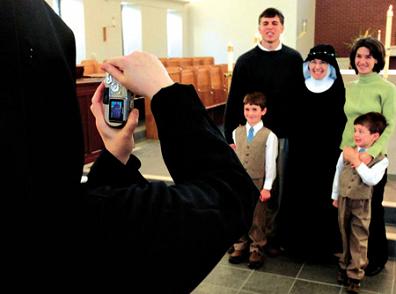Many people have always been disturbed by today’s first
reading (
from Genesis 22): the account of Abraham nearly killing his son at God’s command.
This incident feels even more disturbing nowadays as men and women around the world are killing themselves and others because they think it is what God wants them to do.
Is Abraham – the great patriarch of the Jewish, Christian, and Islamic faiths – therefore the forerunner of today’s suicide bombers?
The answer is
no.
To begin with, God had no intention of having Isaac die at Abraham’s hand: this was a special test for a man with a unique place in salvation history - a test that God knew Abraham would pass.
Secondly, Abraham was not getting his orders from a psychotic, self-appointed middleman: Abraham had already been successfully discerning the voice of God in his life for many years.
Of course, people like to twist things for their own purposes. The evil masters of the suicide bombers may cynically and falsely invoke the obedience of Abraham in their indoctrination. Likewise the extremist enemies of religion cynically and falsely try to portray all who are serious about their faith as being just like suicide bombers.
We base our lives on a faith that comes from
God, not on decadent materialism or on extremist ideology (religious or otherwise).
Abraham is our father in faith – not our father in extremist ideology, but our father in careful discernment of God’s will and trust in that will.
Abraham was always open and listening for God’s will: ready to respond instantly, “
Here I am.”
Even in the very worst seconds of his life, there with his son on Mount Moriah, Abraham was open and listening for God’s will and he was rewarded richly for it: beginning with the life of his son and then so much more.
I will bless you abundantly
and make your descendants as countless
as the stars of the sky and the sands of the seashore;
your descendants shall take possession
of the gates of their enemies,
and in your descendants all the nations of the earth
shall find blessing—
all this because you obeyed my command.Like Abraham, we need to be open to, listening for, and discerning continually the will of God.
We cannot simply coast. Suicide bombers close themselves off and
coast. Ideologues (religious or anti-religious) close themselves off and
coast.
If Abraham had
coasted, Isaac would have died right then and there. Instead, Abraham kept discerning and was rewarded for it.
We too must keep discerning – both when our path seems clear and when our path seems covered in cloud – listening for the voice and will of God in its ever-greater fullness. And by the grace of our Lord Jesus Christ, we too will be rewarded.
Then a cloud came, casting a shadow over them;
from the cloud came a voice,
"This is my beloved Son.
Listen to him."
Suddenly, looking around,
they no longer saw anyone but Jesus...
 A Penitent Blogger
A Penitent Blogger











